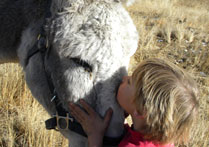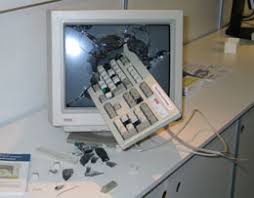
Talking about Sebastian made me eager to talk about Sam. Sebastian, if you read the earlier post, was a feisty old donkey we adopted to keep our runaway horse, Sam, closer to home.
Sam's another story and he deserves his own space.
The picture above isn't Sam - I don't have a photo of him. But it's a pretty good likeness. Sam was the quarter horse my daughter rode in her lessons when she was in junior high school. Gentle, kind and patient, he was the perfect lesson horse. We fell in love with him.
We'd moved to a small town in northwest Connecticut with the hope of eventually buying a horse. I knew the amount of work involved; my dad, a Bronx boy with gentleman farmer dreams, had started breeding Arabian horses when I was about sixteen. I was past that age where most girls are madly in love with horses, but I loved animals and much as I hated the work, I loved the horses. I'll tell you their stories on another day.
So - the opportunity to buy Sam arrived.
"Don't do it," daughter's instructor, who had also become a good friend, advised. "He's headstrong. He's a pain in the butt under saddle. Get a horse that wants to be ridden."
Did we listen? No. We were in love.
So we put a check into the instructor's reluctant hand and began to prepare for Sam's arrival while my daughter joyously visited "her" horse at his stable every day.
I visited him, too, climbing on his back and going for a ride behind the lesson barn without asking permission or paying a lesson fee. It was just me and our horse. Sam was perfectly willing to walk through the woods. He didn't want to trot or canter; he didn't want to work. He just wanted to enjoy the day.
We walked right through a herd of deer together and they didn't pay attention to us. I was magically turned into part of a four legged creature; someone they didn't see as a threat. We paused and stood among them, Sam blowing and shaking his head, the deer contentedly munching grass around us. It was an amazing gift and Sam gave it to me.
But we couldn't leave him at that barn indefinitely.
The barn on our property wasn't in great shape; fencing in the field was non-existent. There was a good box stall on one side of the barn with a dutch door leading outside. Across the aisle was a long, narrow stall that seemed like the right size for a pony. We double checked the latches, cleaned out the stall and installed a thick layer of fresh bedding.
We installed electric fencing around the perimeter of the field. Scout, our sweet herding dog who got her own post here back in December, hit the fence at a dead run twice and fled, yipping, back to the house. She wouldn't be trying to herd the horse.
We were ready.
The big day arrived and we promised the instructor a fine dinner if he'd stay after delivering Sam to his new home. It was a trip of less than two miles, and he decided to make it a real event. Tying bright red ribbons on the bridle, he saddled Sam up and rode him to his new home. The vision of the two of them tripping down the driveway, red streamers flying, is one I doubt I ever forget.
My daughter, naturally, was transported. I was, too.
But reality was quickly established. Sam hated the new stall. He didn't want to go in. The instructor, accustomed to nervous horses, quickly got him in and shut the door.
"Give him time," he said. "It's all new."
But Sam was miserable. He was in a strange place and he was all alone. This gentle giant, who'd never done anything worse than refuse to canter when asked, began to bang on the dutch door through which he'd entered. As my daughter and I stood outside the door, petting his head, reassuring him that everything was okay, Sam continued to beat on the door.
"Make him stop!" my daughter cried.
He didn't.
Sam was determined to get out. I don't think he battered down the door the first day. First, he escaped from the field. He broke through the electric fence and trotted away.
We lived on a country road but the cars that came by were often speeding. He had to go up the road, turn left, follow a second quiet road, cross a county highway, then travel another three quarters of a mile with another left turn to get home.
He did it. Somehow, he was able to remember the route from his arrival, reverse it and find his way back to his barn.
As we were out desperately hunting for him, the phone rang.
"He's here," the instructor said. "He's safe."
We went back, picked him up and brought him home. But he broke out twice more...and I must tell you that I know what determination looks like: it's Sam's big old horse butt powering him back to his friends, to his home.
We left him there, knowing we had to not only improve the security of our barn and our field, but knowing that Sam wasn't going to be happy living all by himself. We needed to find him a friend.
My then-husband spent days measuring, sawing, nailing. He built an absolutely beautiful horse stall with a sliding interior door where there had been a sad little box.
We strengthened the fencing. We adopted Sebastian. We brought Sam home and his wandering days ended.
Sam became a happy couch. My daughter had nowhere to ride him and no one to ride him with (poor planning on our part, absolutely) but she delighted in going out to the field with a book, climbing on Sam's back and lying down on him to read while he grazed. He was a very happy boy and she was a very happy girl. Sebastian lumbered around with Sam and the idyllic scene was right out of a picture book.
But as I told you, the ending is bittersweet. My husband's contract wasn't renewed; we had to sell the house. I tried to hold on to Sam by boarding him at a local stable but the conditions there were awful and the other horses picked on him. He got sick. I nursed him back to health but the message was clear. For Sam's happiness, I had to let him go. My heart was breaking.
I found a rescue organization that promised to either find him a good home or keep him forever. My daughter's heart was broken. Sam climbed onto that trailer and I knew I'd done the right thing for him. A few weeks later, I heard that a girl about my daughter's age had adopted him. They had a farm. He had company. She loved him desperately.
She wrote to my daughter, wanting to make contact, to talk about Sam. My daughter couldn't write back. It's taken years; she'd finally like to talk to that girl, now that both of them are young women. Sam is most certainly gone; he wasn't young.
"I wanted to hear about him, I wanted to go see him. But I just couldn't," she says. And I understand.
















